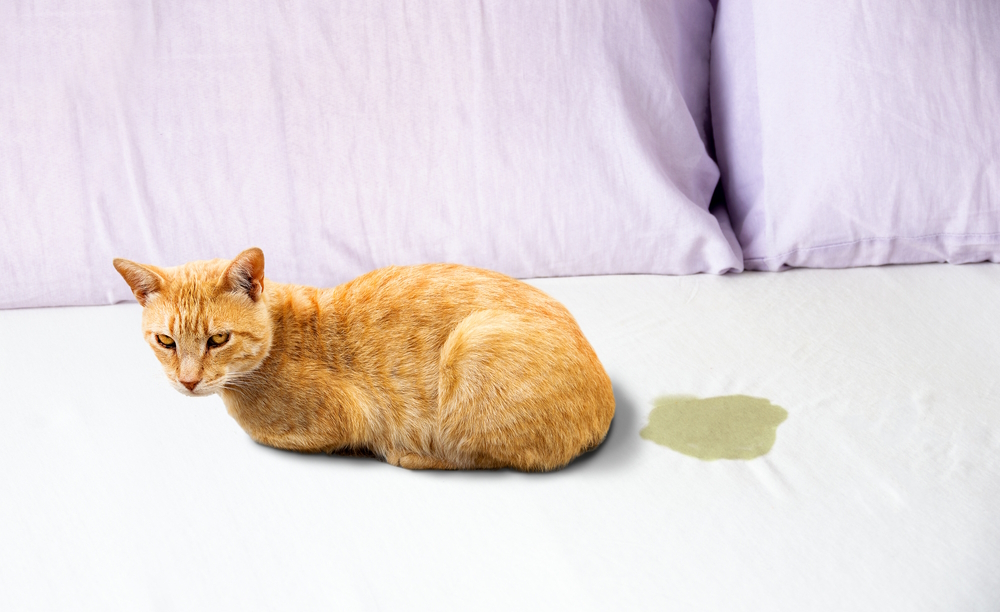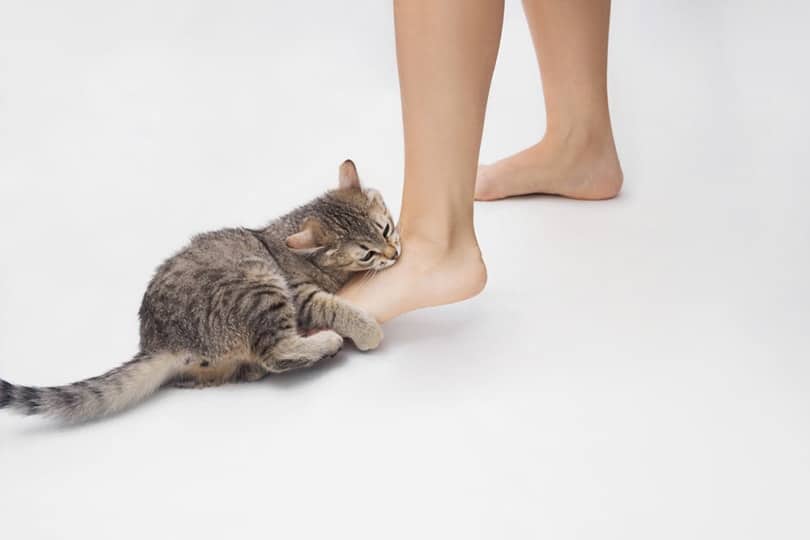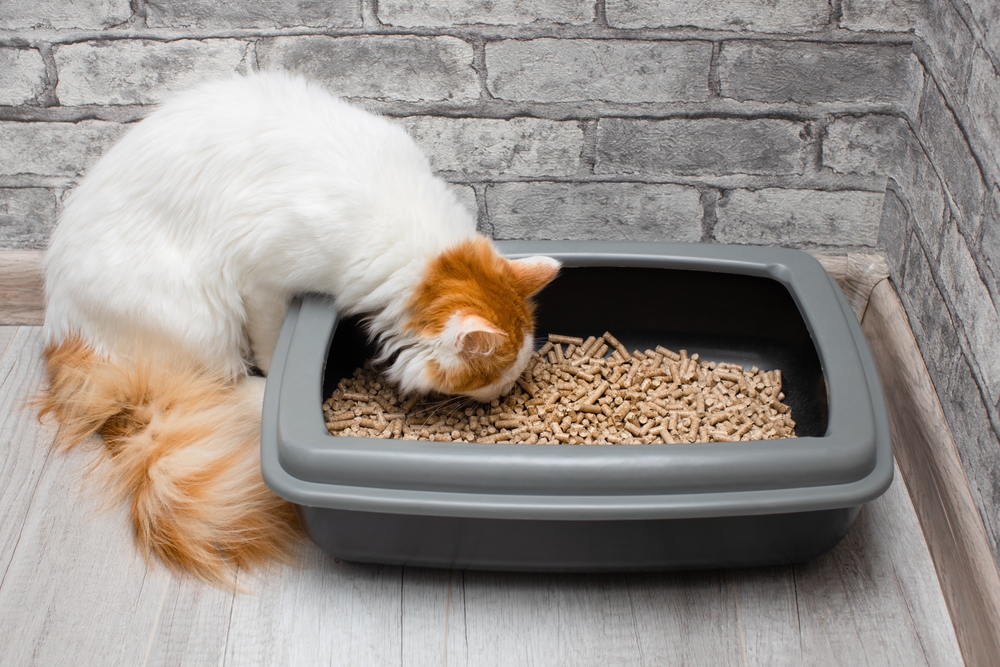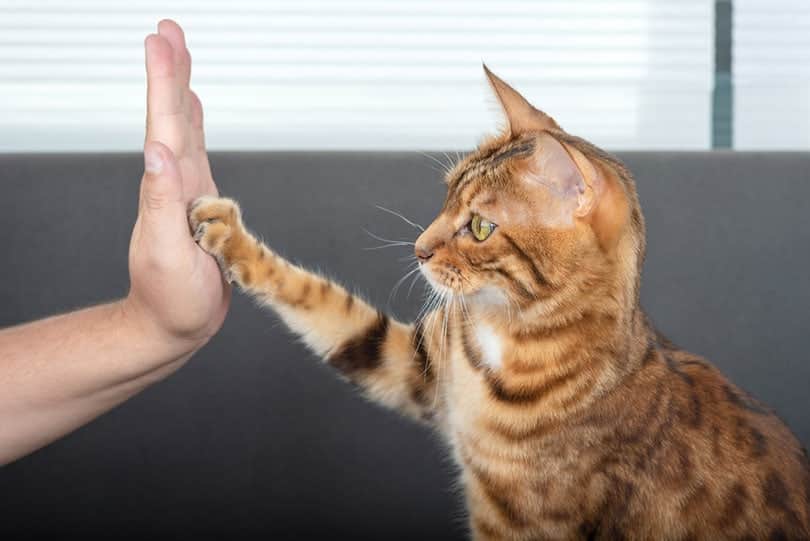Click to Skip Ahead
Have you ever had to ask yourself “why did my cat pee on my bed”? Us too. As cat owners, we love our cats but we don’t love their pee. It’s pungent and difficult to remove from places outside of the litter box. When cats pee on the carpet or floor, it’s bad enough. But when they pee on your bed, it’s even worse. Why is this happening and what can you do to stop it?
In this article, we listed five common reasons that cats pee on their owner’s beds and what you can do about it. Some of these reasons are minor and require an easy fix. Others can be indicative of a medical problem. Once you know why this is happening, you can take the appropriate steps to stop this smelly problem.

The Importance of Proper Cleaning
If you don’t thoroughly clean your bed after your cat has an accident, they may urinate in the same spot again due to lingering smells. An enzyme-based cleaner can eliminate these odors, helping to prevent your cat from thinking it’s an appropriate place to relieve themselves.
Our Favorite Enzyme Cleaner The Hepper Advanced Bio-Enzyme Pet Stain & Odor Eliminator Spray is our favorite all-purpose enzyme cleaner. It kills harmful bacteria and permanently removes even the worst kitty stains and smells, leaving your home fresh and clean! Click here to learn more about this amazing product and get yourself a bottle. At Catster, we’ve admired Hepper for many years, and decided to take a controlling ownership interest so that we could benefit from the outstanding products of this cool cat company!
Image
Product
Details
Best Enzyme Spray

Hepper Advanced Bio-Enzyme Pet Stain & Odor Eliminator Spray
Check Price

The 5 Reasons Your Cat Is Peeing on Your Bed All of a Sudden
1. Health Issue
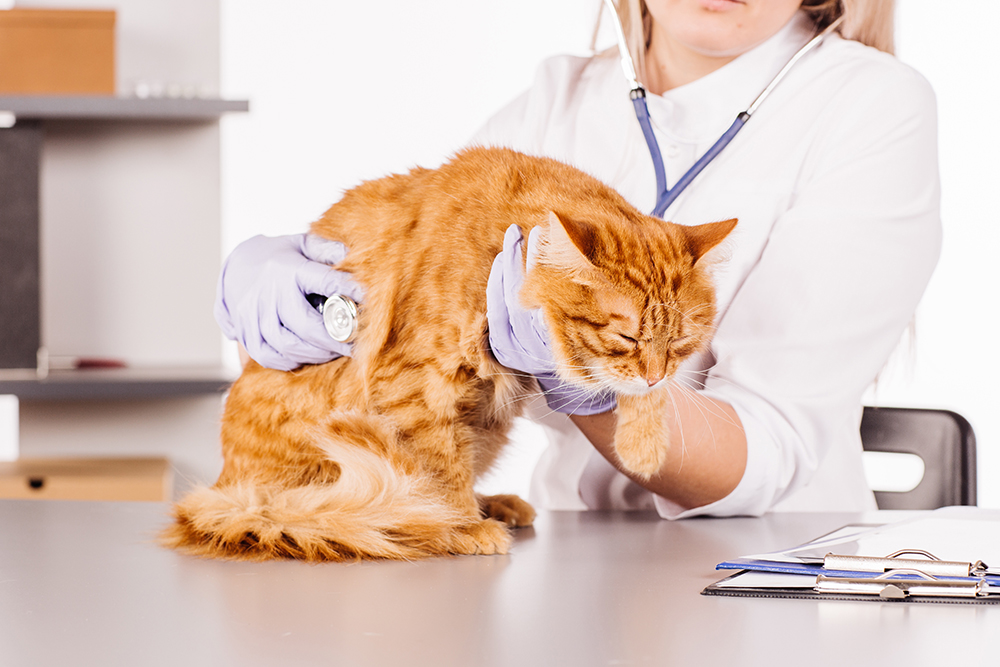
Cats normally pee outside of the litter box when they are experiencing a medical problem. Peeing on your bed could be a sign that this is happening. When your cat starts peeing anywhere outside of the litter box, you should always rule out a medical issue before trying to change this behavior. Often, once the medical condition is treated, the peeing outside of the litter box stops. Diabetes, kidney disease, and urinary tract infections can all cause your cat to pee in strange places. If you notice that your cat is struggling to urinate, yowling when they try to pee, or having blood in their pee, contact your vet right away.
What to Do
Bring your cat to the vet for a full exam. This can include bloodwork and a urine test to check for any signs of infection. If your cat does have an infection, medication will usually be prescribed to treat it. Once your cat is feeling better, they should stop peeing on your bed. In cases of chronic diseases, like kidney disease, the symptoms may be able to be controlled to help your cat feel better, so the peeing will stop.
If you need to speak with a vet but can't get to one, head over to PangoVet. It's an online service where you can talk to a vet online and get the advice you need for your pet — all at an affordable price!
2. Stress
Cats pee in odd places, including our beds, when they’re feeling stressed, anxious, or overwhelmed. Any change in routine can cause a cat to become stressed. Cats are creatures of habit and like to have the same routine every day. Something as minor as moving their litter box could stress them out.
What to Do
Consider what your cat is trying to tell you by peeing on your bed. Did you recently add a new family member or pet to the home? Has your schedule changed? Did you move residences? Find the reason for the stress so you can try to make your cat more comfortable. Keep their new routine as strict as you can so they can get used to it. Be patient: Cats need time to adjust. Make sure you schedule a time during your day to give your cat affection and play time to reassure them that they are still a valued member of the family. The peeing should stop when they feel less stressed.
3. Litter Box Woes
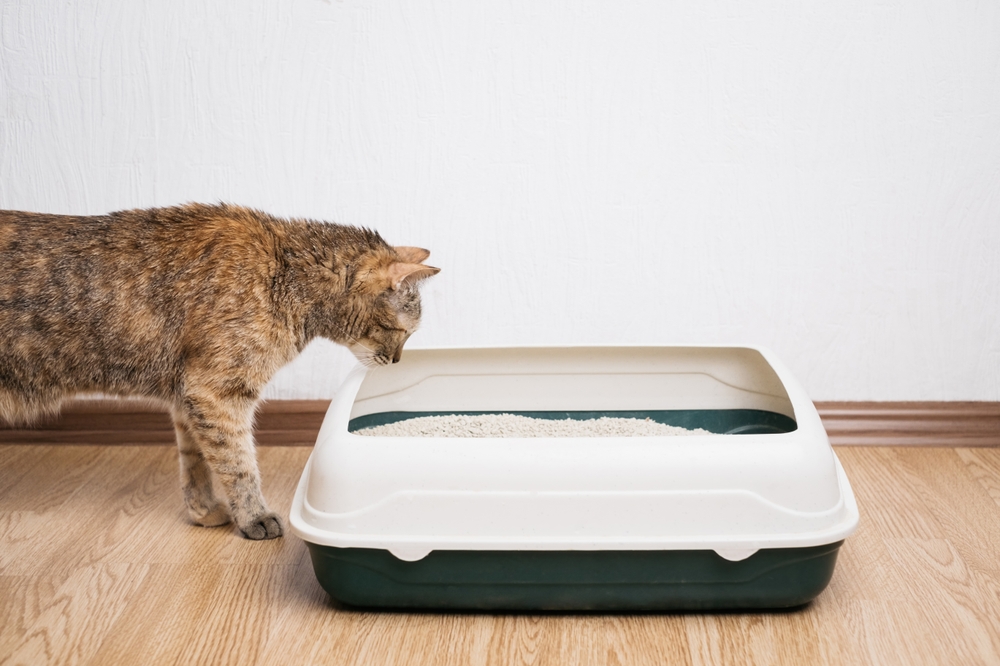
Sometimes the problem is as simple as your cat being unhappy with an aspect of their litter box, so they refuse to use it. Your bed is a much more comfortable option for them. Unfortunately, it can take a while to figure out exactly what is upsetting your cat about their bathroom.
If the litter box is in a location with a great deal of activity, your cat might not feel comfortable using it. If it’s next to a furnace or washing machine that turns on at random times, they might be too anxious to be in it and feel vulnerable.
Your cat may also not like the type of litter that you’re using. The litter box may not be large enough for them to use comfortably. If you have a covered box, it shouldn’t be so small that your cat has to crouch or duck to avoid hitting their head on the cover. If the litter box is too dirty, that’s another reason that your cat may not use it. If your cat shares the box with other cats, there may not be enough options for them, so they just won’t go in it at all.
What to Do
Make the litter box attractive and inviting for your cat. Place it in a quiet, private location that isn’t too far away from the rest of the house. If you have multiple cats, the rule of thumb is one litter box per cat, plus one extra. This way, each cat can use a box whenever they have to, and everyone is comfortable. If you’ve recently changed litters, change back to one that you know your cat likes. If this isn’t possible due to a medical reason, try another brand until you’ve found one that works.
If you have a large cat, make sure they can stand up and turn around comfortably in the litter box. Most importantly, keep it clean. Scoop the box daily. Empty all the litter every 1–2 weeks, wash the box with antibacterial soap and warm water, and refill it with fresh litter. Cats don’t like to dig through their waste to find a clean spot to go. Keeping the box clean will make them want to use it more.
4. Fear
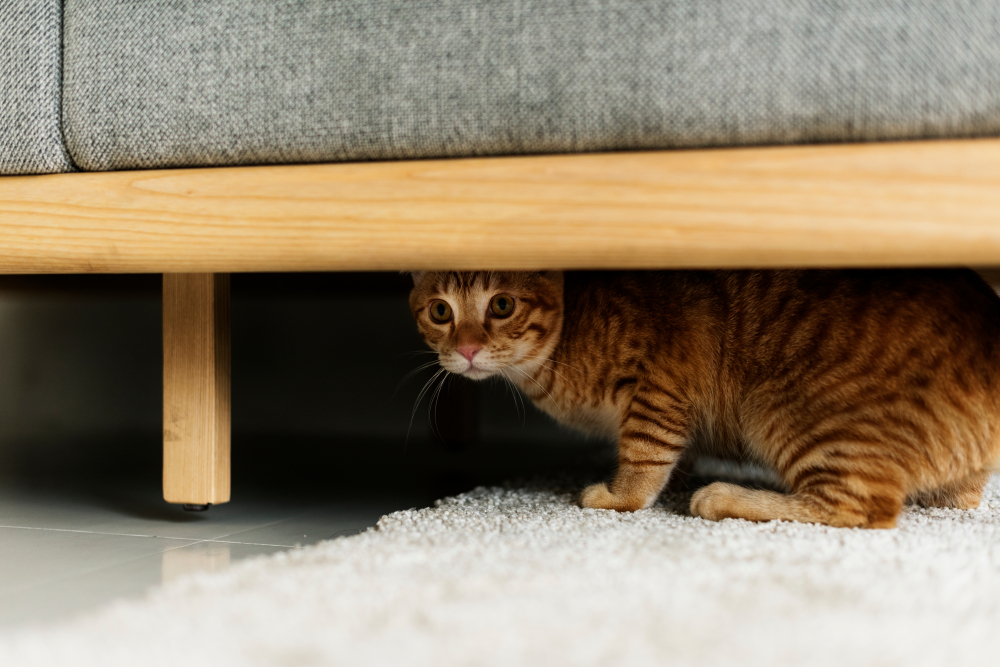
Maybe your cat was napping on your bed and woke up to thunder or fireworks. This loud noise could scare them and make them pee on your bed without really meaning to. In this case, it’s an accident. (That doesn’t make the pee removal any less annoying, though!)
What to Do
The first thing to do is comfort your cat. Fear can cause stress and anxiety, leading to worse problems. Reassure your cat that everything is fine. Let them come and lie next to you if they feel safe doing so. If they’re hiding, move their food, water, and litter box close by so they feel safe coming out to use them. Keep the lights on in the room, and turn on a radio or television to block out some of the noise. Close all the windows and act like everything is just fine. If this is a common occurrence, you may want to keep a waterproof pad on your bed under a blanket so only that blanket gets soiled instead of all your bedding.
5. Marking
Cats pee on things as a way to mark their territory. Both male and female cats do this, but males tend to mark more, especially if they’re not neutered. Your cat is claiming this area as theirs. Has a new person been sleeping in the bed? Have you been staying away from home for long hours? They might be telling you that they want your attention and feel like they need to bond with you.
What to Do
Consider spaying or neutering your cat if you haven’t done so already. Thoroughly clean the bedding to remove all traces of the urine smell. If cats smell their old pee, they can be tempted to continue to pee in the same spot. Spend more time playing with and exercising your cat to help them burn off energy. This is also a good way to bond with your cat and help them feel calmer, reducing their desire to mark.

Should I Just Keep My Cat Out of My Bedroom?
If your cat is peeing on your bed for any of the reasons listed here, they will likely just start peeing somewhere else if you close the bedroom door. If they are used to sleeping in your bedroom, closing the door is a change in their routine that can cause stress and anxiety, making the problem worse.
The best thing to do if your cat is peeing in random places or on your bed is to try to modify the behavior (once you’ve ruled out a medical condition). Be patient and reassuring with your cat. Make sure the pee is completely out of the bedding and doesn’t smell at all so your cat won’t be drawn to it again. You can also start giving your cat treats and meals on your bed. Cats don’t like to pee where they eat. They will eventually start to associate that spot with food instead of a possible toilet.
To ensure they cannot find previously marked spots, use an enzyme cleaner to lift all traces of the urine odors.
At Catster, we’ve admired Hepper for many years and decided to take a controlling ownership interest so that we could benefit from the outstanding products of this cool cat company!

Conclusion
When your cat is peeing on your bed, it’s easy to become impatient and frustrated. It’s important to remember that there is a reason for the behavior and that your cat isn’t doing this to upset you. It’s not a spiteful or hateful act. Usually, if you can figure out why it’s happening, you can solve the issue and put a stop to it once and for all. We hope that these suggestions help you discover why your cat is peeing on your bed and what you can do about it.
See Also:
- Why Do Cats Pee on the Bed or Couch? 5 Vet-Reviewed Reasons & Solutions
- Why Did My Cat Pee on Me While I Was Sleeping? 5 Likely Reasons
Featured Image Credit: cunaplus, Shutterstock

